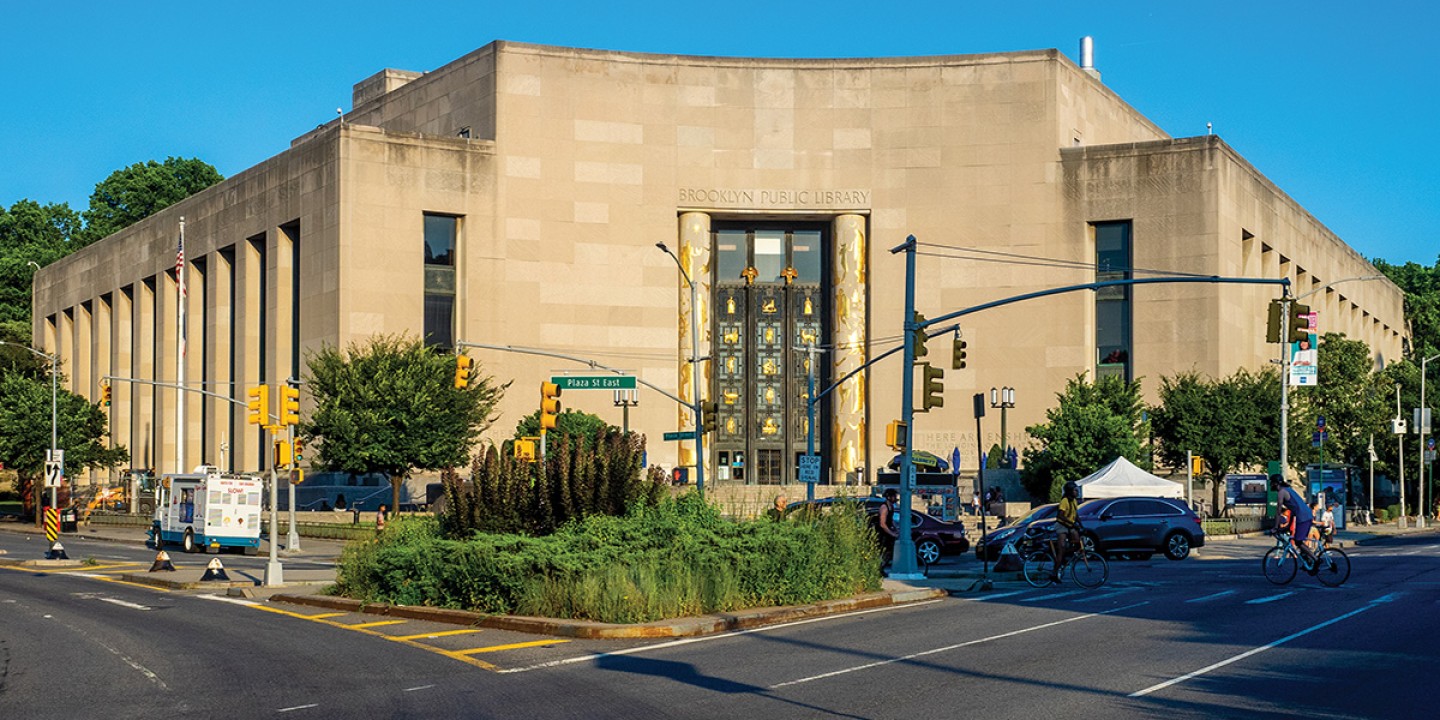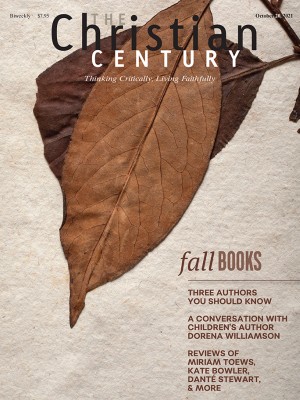The kingdom of heaven is like the Brooklyn Public Library
What it has it must freely give away.

Seen from above, the central branch of the Brooklyn Public Library resembles an open book: concave spine curling around Grand Army Plaza, front and back covers stretching down Flatbush Avenue and Eastern Parkway. From the front steps, it looks like a temple. Glyph-like carvings illuminate the 40-foot bronze doors, flanked by massive limestone pylons. A key inside identifies the figures as authors and fictional characters, but the visitor’s first impression is that of an unfamiliar pantheon, etched in gold and towering overhead.
Francie, the young protagonist of A Tree Grows in Brooklyn, says of her own neighborhood library: “The feeling she had about it was as good as the feeling she had about church.” Reading these lines in a library book at age nine or ten, I felt a tug of recognition: that sleight of hand by which fiction takes our own unformed thoughts and delivers them back to us, beautiful and strange.
Read our latest issue or browse back issues.
Jorge Luis Borges imagined the universe as an infinite library, a system of interlocking hexagons containing every book that could ever be written, sense and nonsense, beauty and despair. He worked as a librarian and wrote the story “The Library of Babel” in his down time on the job. He writes, “The Library is a sphere whose exact center is any one of its hexagons and whose circumference is inaccessible.” Elsewhere, he traces the history of a similar metaphor: God as a sphere whose center is everywhere and circumference nowhere. Borges found this idea troubling, the promise of order and logic spiraling into chaos.
But in my mind, chaos is never far from creativity and must, therefore, belong to God. We are told that God subdues chaos—with the word, no less—to create the world, but that same God plants the seeds of chaos right back in the garden. And the whole world, as we know and love it, grows from its fruit.
My mother took my siblings and me to church every Sunday and the library most Saturdays. This was before young adult literature was a genre, so when I exhausted the children’s section downstairs, I drifted up to the main collection. Bewildered by variety, I located the “classics” shelf and decided this could be a shorthand for quality, in the absence of other metrics. Enough people had found these books worth reading, at least, to keep them in print over the centuries.
Large swaths of what I read in those years were obscure, beyond my comprehension. But the mystery was part of the pleasure, the sense that worlds of meaning lay just out of reach. I felt for George Eliot’s heroines, trapped by convention and domesticity, and wondered that someone named George could envision their lives with such clarity. I read The Master and Margarita and was haunted by the Devil’s act of mercy. After struggling through Tolstoy’s novels, I picked up his comparatively lightweight treatise The Kingdom of God Is Within You, and for months afterward, I heard in the Gospel readings at mass echoes of Tolstoy’s radical, anarchic Christ.
Years later, I became a librarian myself for a time, an unpaid addition to my job teaching fifth grade at a charter school in Bed-Stuy. Jim, the previous teacher-librarian, had kept the library pristine by essentially barring children from the room. He had a complex procedure for borrowing books and mostly kept the door locked.
Under my tenure, the library was always sliding toward chaos—books sprawling sideways on the shelves, the “unshelved” bin overflowing. I used the electronic checkout system Jim had set up, but if a student lost a book, I’d mark it as “checked in” so they could get a new one. The most popular titles were perpetually out of stock. Each new shipment of Amulet or Diary of a Wimpy Kid brought me a childlike thrill.
Every Sunday afternoon after church, I went to the Brooklyn Public Library and strolled the stacks. Browsing the books, each one containing a world entire, I could prolong the sabbath, delay my reentry into the school week. In that library, I experienced a kind of radical prodigality. I once racked up $170 in fees and avoided the building for months, ashamed to show my face. When I returned, missing my routine and sanctuary, I explained to the librarian that I had been borrowing books for my classroom. She erased the fines and handed me a thing of magic: a teacher library card, with which I could check out unlimited books with no overdue fees. She told me to send her an email if any of my students had fees. Have them try to find the books first, she said. We want them back, if possible, but mostly, we want them to be read. I haven’t seen her in years, but when I hear the word librarian, it is her face that springs to mind: thick-rimmed glasses, deep purple lipstick, a row of spikes in her left ear. Charged with keeping order, she understood that at the library’s core is the chaotic, subversive logic of grace. The true librarian is an anarchist at heart.
The logic of the public library runs counter to other American institutions. Libraries produce nothing and sell nothing. They encourage loitering instead of policing it. They offer free services without mandating that anyone receive them or requiring recipients to submit to a demeaning process of demonstrating need. At the Brooklyn Public Library, you can learn English, take classes in computer literacy or Chinese brush painting, practice chair Zumba, get an ID without citizenship documents, see art made by people in prison, compete in video game tournaments. You can enjoy heat or air conditioning if your home lacks them or if you don’t have a home. And if you seek respite from the city’s whirlwind, a place for your mind to grow quiet, you can find that, too, among the stacks.
There were no public libraries in first-century Galilee. I’m not even sure if Jesus was literate. But he answered questions about God and morality with stories—not with a single narrative, but with a treasury of tales. He never defined the kingdom of heaven but instead offered parables about a seed, a fisher, a king, a group of young women. One parable speaks of a farmer whose bounteous harvest threatens to overflow his storehouses; anxiety drives him to build a bigger barn, the better to secure his crop. But in Jesus’ telling, a treasure locked up is no treasure at all. Which must also be true of a treasury of tales. There are those who seek to padlock the Bible, to secure the meaning they have found inside, but Jesus never did this. What a risk: to release your stories into the world, to allow anyone and everyone to interpret them by their own lights. To scatter seed widely and only hope that it will grow. What wondrous love is this?
And so, one more parable: the kingdom of heaven is like a library. Its power has nothing to do with coercion or control. It strives toward order but does not make an idol of its own rules. What it has, it must give away. And somehow, in giving everything away, the library only becomes more itself. To live like a library! To open our doors, to hold nothing so tightly that we destroy it, to give and give and gain our souls in the giving.
A version of this article appears in the print edition under the title “Freely lent.”





